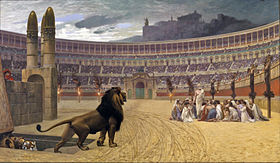The apparent slaughter of 30 Ethiopian Christians by ISIS militants in Libya has provoked GetReligion’s Terry Mattingly to ask whether “our elites (journalists included)” can “still deny the persecution of Christians?” Approvingly, Mattingly quotes the elite Boston Globe journalist John Allen, for whom the slaughter’s “silver lining” is that it has “put an end to a longstanding climate of denial that violent anti-Christian persecution around the world is a genuine, and mounting, human rights menace.”
The charge is an old one, dating back a couple of decades, and helps explain how the elites in Washington came to pass the International Religious Freedom Act, which Bill Clinton signed into law in 1998. Whether the charge is true is another question.
Consider the ill-treatment of Chinese Christians. The New York Times has written about that for many years, as in this pre-ISIS article by Andrew Jacobs about Christian leaders in China “calling for the government to end its persecution” of the underground church. Likewise, the Times has regularly published articles about attacks on Christians in Pakistan (e.g. this pre-ISIS piece, “Hate Engulfs Christians in Pakistan,” by Sabrina Tavernise). And that’s not to mention Laurie Goodstein’s 1998 article on the movement to defend Christians from persecution around the world.
Whether there’s been enough coverage of this sort, in the Times and elsewhere, is a question we could discuss. Apart from that, however, it’s worth bearing in mind that the word “persecution” has a particular history and resonance going back to early Christian times. In the Book of Acts, Stephen asks the Sanhedrin, “Which of the prophets have your fathers not persecuted (non sunt persecuti)?” After he’s stoned to death, “a great persecution” (persecutio magna) descends on the nascent church in Jerusalem. In a letter assailing the Roman proconsul Scapula for attacking Christians in Africa, Tertullian refers to the recent persecution of Christians in Asia by the Emperor Antoninus Pius (Arrius Antoninus in Asia cum persequeretur). And so on.
To this day, “persecution” connotes action by the authorities, whoever they may be. Violence directed against Christians (or any other community) by mobs or armed guerrillas or individual terrorists is not persecution. In the case of ISIS, it may indeed be so, when the violence is committed in territory the organization controls. But that doesn’t seem to have been the case in Libya.
In any event, when Mattingly or Allen criticizes “the climate of denial,” the implication is that something similar to ancient persecutions is happening around the world today, perhaps even aided and abetted by our elites (journalists included). Here and there that’s true. In many places, not so much.






